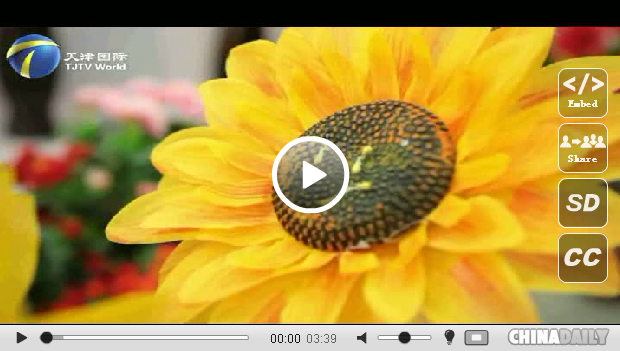Wu Yonghui enrolled her 11-year-old daughter for painting class at Tianjin Youth Children Center during the summer vacation. Wu hopes by doing so, her daughter will be better than her peers in middle-school or even make painting her lifelong career.
Her daughter, Li Ping, has demonstrated talent and great interest in painting, but she says her school's art class is boring and does not help to improve her skills.
Wu is not alone.
While arts classes are readily available in schools, Chinese parents are throwing cash at dazzling array of arts training centers during summer and winter vacations.
Cathay Future, a noted children's art center in Tianjin, has enrolled more than 1,000 children this summer vacation. Painting, dancing and singing are the three most popular.
In China, students with extraordinary talents in any form of arts have an upper hand getting into reputed schools. Their entry requirement in terms of academic scores is lower.
Ironically, it is common for primary or middle schools to make light of arts education.
For example, music, which is supposed to be a compulsory course, is often neglected and treated as an irrelevant subject.
"In China, enrollment rate is the overriding benchmark of a school's rank and popularity. Schools put students' marks at the core, and thus marginalize their artistic development," says Xiong Bingqi, vice-president of 21st Century Education Research Institute and a professor from Shanghai Jiao Tong University. "Expectations for arts teachers are not high, no wonder children play during arts classes in school."
Piano teacher Emma Chen recalls her gloomy days teaching in a national Chinese school in Tianjin.
"My music class was regularly replaced by teachers who taught core subjects such as Chinese and math teachers," recalls Chen, who has quit her job at the school to join an international school. "My mastery of music was stagnated."
The situation in second- and third-tier cities or smaller towns is worse.
Zhang Li, an art teacher at Mingdao Primary School in Haian county of Nantong in Jiangsu province, says most of the teachers, parents and students label arts classes in school as a waste of time and energy.
Arts classes, with meager teaching aids and facilities because of inadequate funds, are often cancelled.
But some teachers remain optimistic.
Zhou Dan, a young music teacher in Chaoyang Branch of Beijing Chen Jinglun Middle School, reveals a bright side when speaking of music education in her school.
"Music education is highly regarded in our school as a compulsory subject," says Zhou, who is mainly in charge of the school's music class and club.
The school's chorus, wind band and dance group frequently take part in international contests, Zhang adds.
"Students look forward to music class and eagerly participate because music class serves as a stress reliever from the heavy studying load," Zhou says.
According to Zhou, Chaoyang district of Beijing as a whole prioritizes stimulating students' artistic temperament and innovation.
Wellington International School, the school Chen is attached to now, has also found a way to tap into students' musical creativity.
In the school's music class, students are given liberty to freely compose a melody on the xylophone.
Chen says the results far exceeded her expectation - nearly everyone could make a spectacular improvisation, which demonstrates their endless and unexplored talents.
"Chinese children seem to swallow their enthusiasm and refuse to stand out, regardless of their solid basic skills. But if you give them a nudge, their presentation will blow your mind," Chen says, adding that as a teacher she also feels much valued and fulfilled.
The good news is a growing number of schools have come to find the importance of treating arts education as main subjects, and have joined hands to work a way out.
Ding Weidong, a member of Teaching and Research Department in Haian county, launched a website in 2005 called Xinyuan Art Education. The network is a virtual platform to share teaching tactics and build connections among art teachers of different schools.
Art teachers from various schools within the county converge online whenever they want, throwing themselves into heated discussion over one certain topic.
"I initiate an art topic every Monday, followed by a seminar, which greatly stimulates the teachers," Ding says. "Joint lesson preparation on every Thursday afternoon is another routine. Teachers share their own opinions, challenging and convincing one another. Finally, they reach a compromise with an agreed teaching plan drafted."
But, Ding says there is still a discrepancy between parents and children's mentality about the importance of arts.
"We are moving forward, but it's still a long way to go," says Ding.
Contact the writers through [email protected].
Wang Yuke contributed to the story.
(China Daily 08/21/2013 page20)





